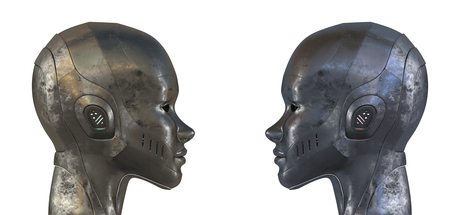Man vs machine

As machines continue to displace humans in a variety of roles, international academic, business and technology leaders are claiming that workers will need to become 'more human' in order to compete in the future.
Each year, Oxford University invites business leaders and luminaries from Silicon Valley and beyond to attend 'Silicon Valley Comes to Oxford (SVCtO)' for a series of masterclasses, panel debates, plenaries and networking events.
The focus for this year's event was the impact and challenges of augmented humanity on the workplace and employment in the future.
Technology is increasingly capable of challenging humans in a range of cognitive tasks, not just manual labour. Many more occupations are now at risk of computerisation, but technology is still no substitute for perception, creativity and social skills.
According to Michael Osborne, Associate Professor University of Oxford and Co-Director, Oxford Martin Programme on Technology and Employment, "Computers were initially used to carry out routine tasks involving explicit rule-based activities, which tended to be viewed as freeing people from mundane and repetitive work. But big data means that algorithms from machine learning can now easily substitute for labour in a much wider range of non-routine tasks, from legal writing to truck driving. In addition, advanced robots are gaining enhanced senses and dexterity, allowing them to perform more complex manual tasks."
Professor Osborne presented a seminar titled 'Technology at work: the future of employment' at this year's SVCtO. He predicts the roles and occupations most at risk from computerisation in the future, as well as the new jobs and emerging industries that are likely to replace them. At risk are occupations such as fraud detection, legal research, healthcare diagnostics, telemarketing and reception duties. Those likely to be in demand include wind energy engineers, solar energy installation managers, nanotechnology engineers and informatics nurse specialists.
"Tasks that are non-susceptible to computerisation require creative and social intelligence," says Osborne.
"For workers to win the race against technology, therefore, they will have to acquire creative and social skills - forcing a revaluation of our attitudes to education and development.
Other topics for discussion at SVCtO included 'The Rise of the Humans: How to Outsmart the Digital Deluge' by Dave Coplin, chief envisioning officer at Microsoft UK. Coplin argued that while computerisation of routine tasks was meant to free up time for leisure and for more complex and interesting work, the opposite has happened and humans are drowning in a "deluge of data" that keeps us from doing meaningful, real work. In addition, he believes an obsession with 'productivity' and the 'rate of output' means that "in a world defined by its processes and not its outcomes, working smarter is not an option and the only feasible alternative is simply to work harder".
Phil Libin, CEO of Evernote, begs to differ. He believes that companies need to keep up with the tools and technologies that result in a more productive, efficient and plugged-in workforce and that augmented intelligence (AI) technology ensures that employees feel plugged in and connected.
Fascinating topic - regardless of which school of thought you follow. The concept of man vs machine was once the stuff of sci-fi, but it seems the reality is much closer than we imagined.
All-electric haulage fleet under mining alliance
A strategic alliance between Newmont and Caterpillar will see the rapid deployment of an...
How to measure ROI of field service management software
Some ROIs are easier to calculate than others. It's important to consider both tangible and...
Preparing the grid for electric vehicles
A new $3.4 million trial will help support growing adoption of electric vehicles across Australia...



